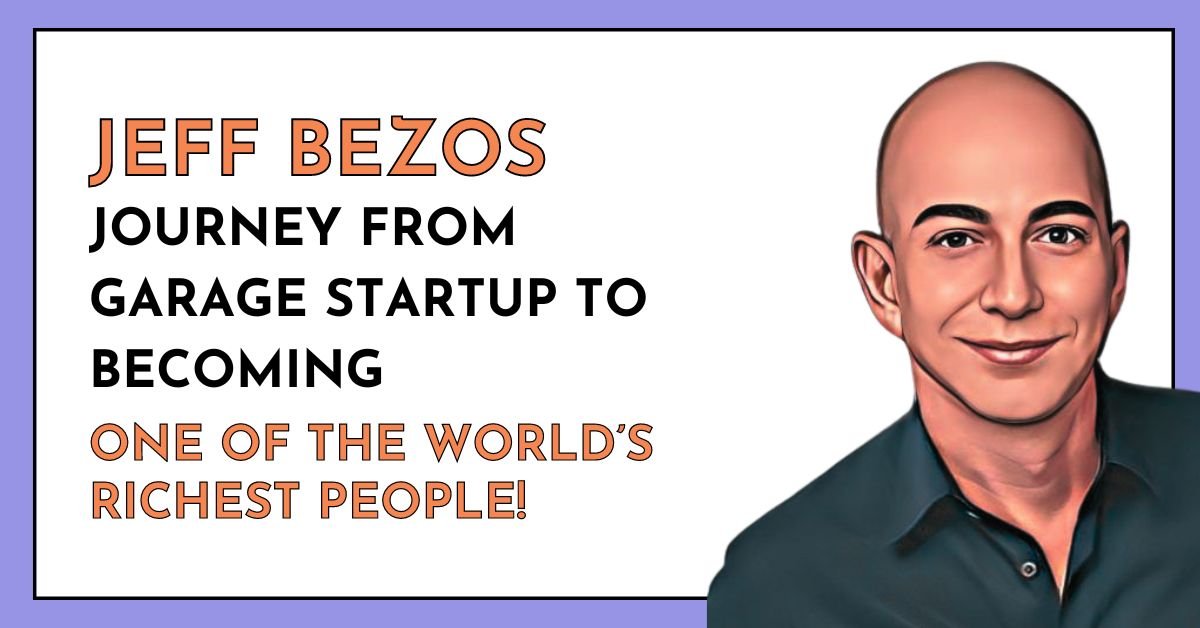Introduction
Amazon’s founder, Jeff Bezos, has come to represent remarkable riches and success. Rising from small beginnings, Bezos turned an online bookshop into a worldwide enterprise redefining retail and technology. His path to becoming among the richest persons on Earth is evidence of innovative ideas, constant creativity, and a fearless readiness to take chances. Examining the major decisions, tactics, and benchmarks that molded Bezos’s journey helps one to understand his extraordinary accomplishment.
1. Early Life and Education

January 12, 1964, Jeff Bezos was born in Albuquerque, New Mexico. Growing up with a young mother and then adopted by his stepfather, Bezos exhibited early scientific and technological enthusiasm. He was always fascinated; he spent most of his early years creating projects like a handmade alarm system to keep his brothers out of his room and experimenting with tools.
Academically, especially in math and science, Bezos was exceptional. Attending Miami Palmetto High School, he grew to love computers. After high school, Bezos enrolled at Princeton University where he graduated in 1986 with degrees in computer science and electrical engineering. His education set the foundation for his future activities by arming him with the technical abilities and problem-solving aptitude required later in his entrepreneurial career.
2. Early Career and Founding of Amazon

Following his Princeton graduation, Jeff Bezos started his career on Wall Street working at Fitel, Bankers Trust, and D. E. Shaw & Co. Bezos first found the promise of the internet while working at D. E. Shaw, a hedge fund. Online retail might be a game-changer, he soon realized especially for book sales with large choices but rather simple shipping.
Bezos bravely decided in 1994 to follow his goal by quitting his high-paying career. Originally an online bookshop, he relocated to Seattle and launched Amazon.com. Beginning in his garage, Bezos concentrated on customer service and a large assortment—two essential elements that distinguish Amazon from other online stores.
The rapid expansion of Amazon allowed it to increase the range of products it offered, so preparing the ground for what would become one of the most important corporate empires worldwide. Early doubts notwithstanding, Bezos stayed faithful to his long-term vision, setting the foundation for Amazon’s explosive expansion and ultimate control in the online retail space.
-
Growth and Expansion of Amazon
Amazon grew quickly and deliberately. Early on, the business grew outside books and progressively added electronics, music, and a broad array of other items. Amazon rapidly became the preferred online marketplace for millions of consumers by stressing a user-friendly design, speedy shipping, and customer happiness.
The introduction of Amazon Prime in 2005 marked a turning point in Amazon’s history. Offering free two-day shipping and then adding streaming services, this subscription business became a huge hit boosting customer loyalty and higher revenues. Did you know Open AI launches revolutionizing Search Gpt? With Amazon Web Services (AWS) in 2006, the corporation also entered the realm of cloud computing, which has since grown to be one of its most profitable divisions offering necessary infrastructure for innumerable online businesses.
Amazon’s rise was much aided by international growth. Entering markets across Europe, Asia, and beyond, the corporation modified its strategy to fit local demands while keeping its basic values. Strategic purchases like buying Whole Foods and Zappos helped Amazon diversify its products and improve its market posture.
Using ongoing innovation and a tireless concentration on expansion, Amazon transformed from an online bookshop into a worldwide powerhouse impacting sectors ranging from retail to entertainment to technology.
3. Bezos’ Vision and Leadership Style

Amazon’s success has been much aided by Jeff Bezos’s vision and leadership approach. Bezos stressed a long-term strategy from the start, usually giving innovation and expansion top priority over temporary gains. Reflecting his readiness to take chances and invest in untested ideas, he famously declared that Amazon was ready to be misinterpreted for extended lengths of time.
The customer-centric attitude of Bezos is fundamental for his leadership. He thought that emphasizing customer pleasure would eventually help a company to flourish. From tailored recommendations to the flawless shopping experience Prime members enjoy, many of Amazon’s most important inventions sprang from this idea.
Within Amazon, Bezos also promoted a culture of great expectations and responsibility. Under his guiding ideas, “Invent and Simplify” and “Have Backbone; Disagree and Commit,” staff members were urged to dream large, question the current quo, and own their work. Amazon maintains its leadership in technology and e-commerce thanks in great part to this innovative and always improving culture.
All told, Bezos’s vision and leadership have been about pushing limits, trying new ideas, and keeping a relentless focus on what’s best for the customer—all of which have been vital in Amazon’s unheard-of expansion.
4. Wealth Accumulation and Investments

The riches of Jeff Bezos matched the success of Amazon. Bezos became among the richest persons in the world as Amazon grew and his net worth exploded with the soaring stock price. Bezos made various calculated acquisitions and investments that diversified his portfolio and raised his wealth beyond only Amazon.
One of his most well-known endeavors outside of Amazon is Blue Origin, a private aircraft business started in 2000 aimed at increasing space travel availability. Reflecting his long-term view of increasing mankind’s presence in space, Bezos has committed billions of dollars to Blue Origin.
When Bezos acquired The Washington Post in 2013, he entered the media industry. Under his supervision, the newspaper has embraced the digital age, improving its financial status and extending its audience all around.
Using his venture capital firm, Bezos Expeditions, Bezos has also made investments in a broad spectrum of businesses. These diversified investments—in real estate, technology, and healthcare as well as other sectors—help to guarantee his financial future outside of Amazon.
Bezos has lately focused more on philanthropy. Launched in 2018, his Bezos Day One Fund concentrates on building a network of non-profit preschools and helping homeless families. Though less publicized than those of other billionaires, his charitable activities show a changing attitude to how he spends his enormous wealth.
5. Challenges and Controversies

Jeff Bezos has had several difficulties and controversies over his career despite his great achievements. Governments and authorities all around started paying closer attention to Amazon as it expanded. Antitrust investigations have been conducted on the corporation; detractors contend that Amazon’s dominance stunts competition and hurts small businesses.
Additionally under fire for Amazon’s labor policies is Bezos. Reports of difficult working conditions in Amazon warehouses—long hours and high-stress environments—have spurred discussions on workers’ rights. Even if Amazon has responded to some of these issues—such as increasing the minimum pay for American workers—the criticism continues.
Another area Amazon and Bezos have encountered criticism is the environmental effect. Being a major worldwide retailer, Amazon has a noteworthy carbon footprint. Bezos responded by starting the Climate Pledge, pledging Amazon to reach net-zero carbon emissions by 2040 and funding environmental projects throughout the business.
Personally, Bezos has also been under fire for his well-reported 2019 divorce, which resulted in a sizable payout but had no effect on his general fortune. Bezos has stayed concentrated on Amazon’s expansion and his other projects throughout these difficulties, negotiating conflicts in a calculated manner that has placed him at the forefront of world business.
6. Legacy and Impact on Future Entrepreneurs

The effects of Jeff Bezos on entrepreneurship and business are significant. Many businesspeople have been motivated to think big and follow their ideas with tenacity by their path from a little online bookshop to creating one of the most valuable firms in the world.
Setting new benchmarks for consumer service, logistics, and technical innovation, Bezos transformed e-commerce. Aspiring business leaders now learn most from his emphasis on long-term development, openness to experimentation, and fast scaling abilities. The success of Amazon Web Services (AWS) also emphasizes how thinking outside the box may result in whole new income sources and industry leadership from outside the main line of business.
Beyond Amazon, Bezos’s activities such as Blue Origin and his purchase of The Washington Post show his conviction in stretching limits and investigating uncharted territory. Emphasizing a customer-centric culture and high standards, his leadership style has affected how businesses all around conduct and innovate.
Amazon’s CEO’s legacy shapes the corporate environment even as Bezos distances himself from his post to concentrate on other interests. His ability to spot possibilities, take measured risks, and keep a tireless drive to innovate—all while keeping focused on delivering value to customers—allows future entrepreneurs to learn.
Conclusion
From a modest startup entrepreneur to one of the richest people on Earth, Jeff Bezos’s path is an amazing tale of vision, inventiveness, and tenacity. His foresight of the possibilities of e-commerce and technology combined with his unwavering attention to customer happiness and long-term development has transformed several sectors.
Beyond Amazon, Bezos makes major contributions to journalism, philanthropy, and space exploration. His style of leadership and creativity has raised standards for companies all around and for entrepreneurs.
Bezos’s legacy is evidence of the force of creative thinking and strategic risk-taking even as he keeps investigating new businesses and tackling modern problems. His narrative inspires the next generations to challenge limits and realize their unique achievement by teaching important lessons in ambition, flexibility, and the search for perfection.
Frequently Asked Questions (FAQ’s)
-
How did Jeff Bezos start Amazon?
Originally starting Amazon as an online bookshop in 1994, Jeff Bezos Focused on a large book range and a customer-centric strategy, he first ran the company out of his garage in Seattle. The business developed into a top worldwide e-commerce platform rapidly and entered new product lines.
-
What are some of Jeff Bezos’ most notable investments?
In addition to Amazon, Jeff Bezos invested heavily utilizing his venture capital company, Bezos Expeditions. Among the interesting purchases are Blue Origin, his private aviation business; The Washington Post, which he acquired in 2013; and other companies in fields like real estate, technology, and healthcare.
-
How did Jeff Bezos’ leadership style influence Amazon?
Long-term thinking, client happiness, and innovation are underlined in Jeff Bezos’ leadership approach. Key elements in Amazon’s success and capacity to upend established sectors have been his emphasis on high standards, openness to experimentation, and dedication to personal development.
-
What challenges and controversies has Jeff Bezos faced?
Over Amazon’s labor policies, Jeff Bezos has come under fire on warehouse working conditions. Amazon has also come under examination for antitrust concerns about its market leadership. Though he has promised to solve these problems via the Climate Pledge, Bezos has also come under fire for Amazon’s environmental impact.
-
How has Jeff Bezos’ wealth evolved?
The success of Amazon has mostly contributed to Jeff Bezos’ riches; as the stock price of the company skyrocketed, his net worth rose noticeably. His riches also come from diversified investments in the media and aerospace industries. Amazon’s stock fluctuates, yet Bezos is among the richest people on Earth.
-
What is Jeff Bezos’ legacy for future entrepreneurs?
Among Jeff Bezos’s legacy are strategic investments, leadership qualities, and a creative approach to e-commerce. Future business owners hoping to have a big influence in their sectors can learn a lot from his focus on customer-centricity, long-term development, and openness to challenge conventional business models.

